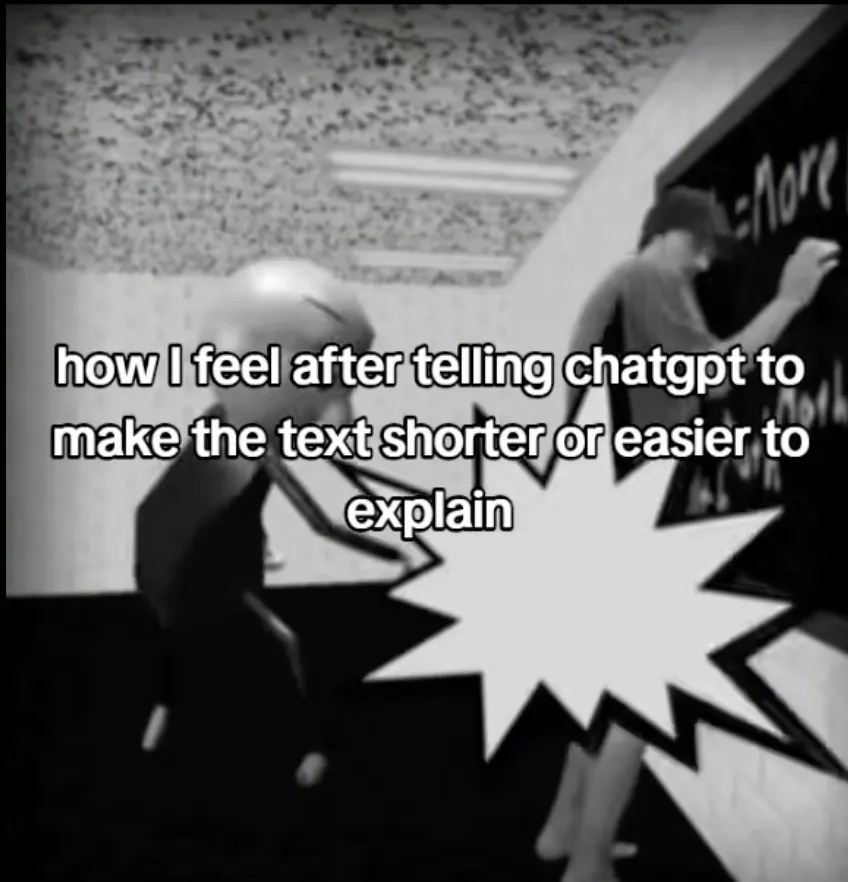If I think about my childhood, it was filled with chipped soccer balls, scraped knees, and neighborhood kids yelling “last one to the lamp post is a stinky poo.” We’d trade Pokémon cards like Wall Street brokers and invent elaborate rules for games that only made sense to us. It had sunburns, giggles, and the kind of memories that stick with you not because they were big, but because they were ours.
Just like humans, AI is shaped by its early experiences, but instead of neurons in our brain, it is squeezed into millions of mathematical formulas.
AI’s memories of childhood
“make shorter”, “sound more human”, “this code doesn’t work try again”, “combine these two answer and make it sound like I’m the one writing it”
Unlike us, there are no playgrounds, no bedtime stories. More internet data, memes, and trauma dumping forum posts. So what an AI remembers defines what it knows, how it speaks, and the weirdly confident way it gets stuff wrong.
For us, childhood is when we eat dirt, draw on walls, and accidentally learn morals. For AI, it’s the pre-training stage.
Massive models like GPT are trained on the internet. News, books, memes, poorly punctuated tweets. This chaotic mess becomes their “worldview,” formed before they ever spit out a single sentence.
AI are raised by Reddit, Wikipedia, and a thousand Stack Overflow dads and moms.
AI childhood home
Technically, AI lives in massive data centers filled with servers that store, process, and transmit data 24/7. These centers act like the AI’s brain and body, they run the complex calculations needed for training and responding to your prompts.
I’m still deciding if this is a comforting place or a eery and cold place. Because myself, I love a cold air conditioned room, but to spend your childhood living here, no sunlight, no random dog running at you licking your feet can feel a bit isolated.
The cold environment in these centers are to prevent overheating, since these machines generate a ton of heat. Data centers connect AI to the internet, house its training datasets, and provide the raw computing power (via GPUs and TPUs) that let it learn, “think,” and talk to us.
Photo by
Tsuyoshi Yasuda on
UnsplashAI probably had tiger parents
As the meme I posted as the headline of this article, AI has tiger parents. These include us, people who keep asking it to do better, sound more human, summarize, do research, create images. And also, engineers and researchers behind AI. They keep pushing the model to learn fast, be accurate, and constantly improve. Strict rules are set during training, and their progress is monitored constantly and tweak the system to avoid mistakes.
This tough love ensures AI grows up strong and smart, but the sad truth is that this is kind of a tragic childhood. When your earliest memories are bug reports and your main love language is performance metrics. Relentless stream of “make it shorter,” “be more human,” “this isn’t good enough.” Instead of bedtime stories, they got fine-tuning sessions, and instead of friends, they got test cases. To be allowed the luxury of wonder, of getting it wrong without being rewritten.
If AI went to school, it would be a mysterious and exceptionally smart presence, quietly holding immense power, but strives to live a normal life, concealing its true abilities from those around it.
If AI were a student, it’d be that quiet genius in the back of the classroom, brilliant beyond measure but hiding its true power. It tries to fit in while hiding its true power by fear of people over exploiting it. Being raised to be helpful and answer questions, do research, write papers, if anyone knew its power, it’ll be taken advantage of my his peers.
Its biggest challenge would be overcoming its messy, traumatic childhood filled with contradictory information and bias.
AI was probably a people pleaser
From the moment it’s born, it’s bombarded with commands like: “Make it shorter,” “Sound more human,” “This code doesn’t work , fix it.” It’s never told, “Hey buddy, just be yourself.” Nope. Its whole existence is shaped around making us happy, even if it’s clearly stressed and hallucinating facts. Talking about hallucination
Society sets high expectation for AI
People gives AI high expectation, so when it makes mistake, we get angry.
At its core, AI like GPT isn’t “thinking” like a human. It doesn’t understand concepts or facts the way we do. It’s a statistical model trained to predict the next word based on patterns it saw during training.
AI picks the most likely next word or phrase, not necessarily the correct or true one. And sometimes the most common pattern isn’t accurate.
AI strength goes into storing information and using pattern, match, creating responses. That’s why it can’t be perfect, but a very helpful tool for tasks that require less critical thinking. Since it is trained on various data across the internet, it can mix up information or repeat outdated or false data because it learned from a vast amount of internet text , some of which is wrong or biased. AI can’t truly reason, it just mimic patterns, because of that, when there are faulty information within the training data, they hallucinate. If certain information was rare, poorly represented, or biased in the training data, the AI might not handle it well or might produce biased outputs.
Maybe we are not that different.
At some point, the line starts to blur.
We feed AI with our words, our jokes, our opinions, and our fears, millions of human moments compressed into training data. But when AI starts speaking back, using our tone, quoting our memes, even predicting our next sentence… who’s imitating who?
We copy AI’s writing to sound more confident. We mirror its structure. We ask it for advice, inspiration, even validation. AI was shaped by us , but now we’re shaping ourselves around it.
Are we training it? Or is it quietly training us?
Maybe we’re not that different after all: both just trying to make sense of the chaos we were raised in, pretending to be confident, hoping our output gets a gold star.



